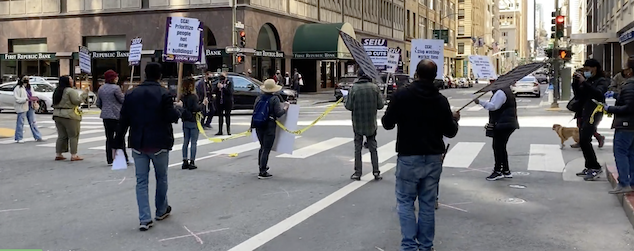News
California College of Art workers go on strike
 Workers at the Caliornia College of the Arts walking a picket line. (Photo: SEIU Local 1021)
Workers at the Caliornia College of the Arts walking a picket line. (Photo: SEIU Local 1021)California College of the Arts employees with the Service Employees International Union Local 1021 went on strike today (Feb. 8) at the private college’s Oakland and San Francisco campuses. The union, which also represents CCA adjunct faculty, alleges that the employer is committing unfair labor practices violating federal law.
The CCA strike is the first such labor action at a private college in California since a brief a one-day work stoppage at Pepperdine 46 years ago.
A sticking point between the employer and represented employees is that the bargaining process for a first contract began in October 2019. As a result, about 100 CCA staff (admissions officers, librarians, IT specialists and studio managers) in SEIU Local 1021 are walking a picket line to win economic demands such as higher pay.
Most workers, however, have had no raises since January 2020 and no retirement contributions for a full year, according to SEIU
For union members, bread-and-butter issues rank high. Early last December, 97 percent of the CCA staff that SEIU Local 1021 represents voted to authorize its contract negotiating members to call a strike.
The lowest paid SEIU Local 1021 worker earns just under $37,000 annually, the highest gets $110,000 per year, according to the union.
CCA Libraries Public Services Manager Paul Navarrete is a member of the union contract negotiations team. “We hope going on strike will result in a contract that we on the bargaining team can proudly recommend to our members: a contract that raises salaries for the lowest paid workers,” he said in a statement, “wins seniority rights that will help retain our great staff members, and improves student services.”
The CCA is offering a 2 percent wage increase effective this month. In fact, some CCA employees did receive raises specific to their positions. Most workers, however, have had no raises since January 2020, and no retirement contributions for a full year, according to Jennie Smith-Camejo of SEIU Local 1021.
One side sees the negotiations package as a glass half-full; the other side sees it as half-empty. A resolution to the negotiations over a first contract could fall either way — or somewhere in between.
The union points to the six-figure annual salaries of CCA administrators…
David Owens-Hill is a CCA spokesperson. “The college offered a comprehensive collective bargaining agreement proposal that included a wage increase for all staff,” he told Capitol Weekly. “This increase responsibly balanced the college’s desire to raise wages for its staff with its commitment to a financially sustainable future for the college. The economic package negotiations are ongoing, and you can find up-to-date information here.
According to Owens-Hill, the CCA is unable to afford the pay raises what the SEIU Local 1021 employees seek, as that would correspondingly hike student tuition. The union points to the six-figure annual salaries of CCA administrators as proof that such a proposition conceals more than it reveals.
One of the strikers walking the picket line is Cynthia Santos. She is a CCA support specialist and alumnus, who has been involved with the private college since 2011.
The CCA strike began t0day and ends Friday, Feb. 11, according to the union. Strikers are rallying on the CCA campuses in Oakland and San Francisco, beginning at 8 a.m. and ending at 5 p.m., according to the union.
The current strike is cancelling CCA classes, closing facilities and studios and interrupting services.
CCA faulty, adjunct professors and students are backing the strikers, according to SEIU Local 1021. In addition, there are campus teach-ins on a range of topics, from protest-signs to the fashion industry’s history of labor militancy.
The CCA strike is the first such labor action at a private college since a one-day work stoppage at Pepperdine in 1976. The current strike is cancelling CCA classes, closing facilities and studios and interrupting services. Such employee militancy is widespread in the current pandemic economy. The Cornell Institute for Labor Relations has tracked 402 strikes nationwide since 2022 began.
According to reporter Mike Elk in “How Black & Brown Workers Are Redefining the Strike in a Digital COVID Era,” nonwhite workers are in the vanguard of the strike wave during the pandemic. “With essential workers disproportionately hailing from communities of color, the strike wave movement has been particularly strong in these communities,” he writes.
According to SEIU Local 1021, some 15 local elected leaders, who include nine of the eleven San Francisco Board of Supervisors members, support the CCA strikers. At the state Capitol, there is also backing for resolving the CCA strike in a way that meets the employees’ demands for economic equity.
“As a longtime advocate for students and a former school board member,” Assemblymember Mia Bonta (D-Oakland), told Capitol Weekly, “I know that the path to better student outcomes includes a high quality and experienced workforce. I support strengthening educational opportunities here in Oakland and the East Bay, and encourage a resolution that invests in staff and students of the California College of the Arts.”
Political support is big for the CCA strikers. So are funds to help them pay bills while they miss wage income from walking off the job. Social media plays a big part in this effort. To this end, there is a GoFundMe strike fund to help strikers at press time had raised close to $16,000 since CCA staff union members formed it six days ago.
—
Editor’s Note: Seth Sandronsky reports regularly for Capitol Weekly. Contact him at [email protected].
Want to see more stories like this? Sign up for The Roundup, the free daily newsletter about California politics from the editors of Capitol Weekly. Stay up to date on the news you need to know.
Sign up below, then look for a confirmation email in your inbox.

Leave a Reply